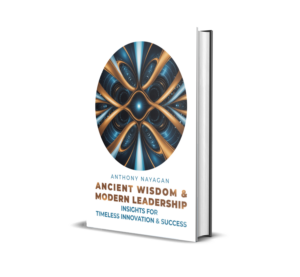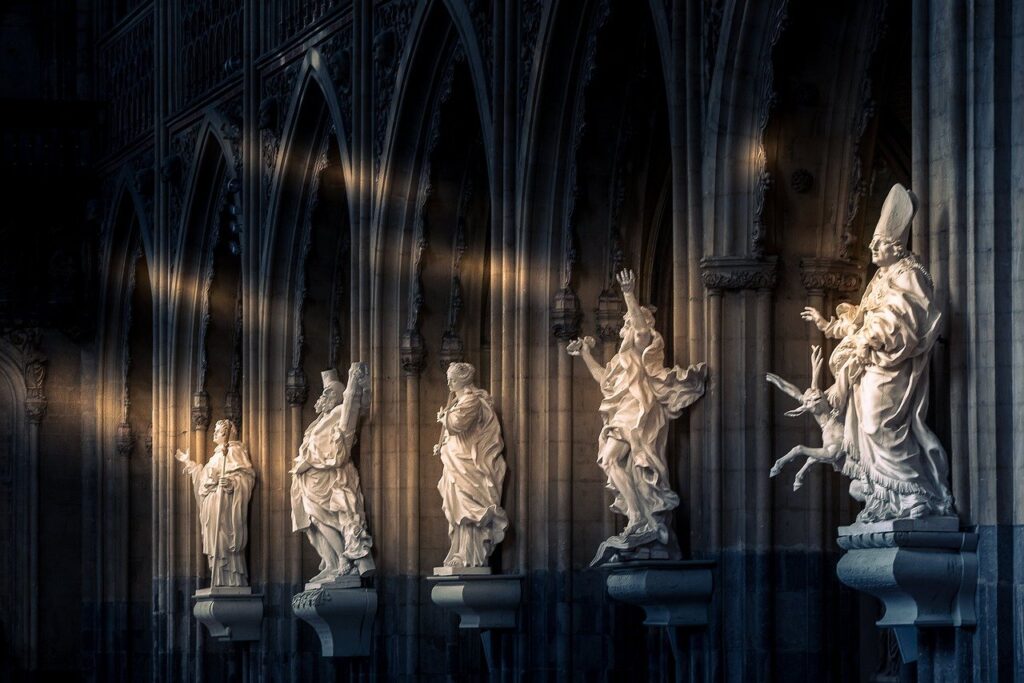How Spiritual Enlightenment Unlocks Authentic Creativity and Leadership
The Power of Inner Freedom
Inner freedom is the bedrock of a life lived in authenticity, creativity, love, and genuine emotional expression. For thought leaders and innovators in modern society, this concept is not just an ideal but a necessity. Without inner freedom, the outcomes we strive for—such as love, creativity, devotion, and innovation—are diminished in their authenticity and fullness. The path to achieving this inner freedom is spiritual enlightenment, a journey that allows individuals to connect deeply with their divine nature and express their true selves.
Historically, the Church has played a dual role—on one hand, offering spiritual guidance, and on the other, imposing moral theology that has often limited inner freedom. In this article, we explore the importance of inner freedom, the Church’s historical impact on it, and the path forward for leaders and innovators who seek to live enriched, spiritually-aligned lives.
The Foundation of Inner Freedom
Inner freedom is not about the absence of moral responsibility. Instead, it is about living in alignment with the divine love within us, a state achieved through spiritual enlightenment. For innovators and leaders, this freedom is crucial as it allows for genuine creativity and leadership unbound by external constraints.
When we speak of inner freedom, we refer to the state where individuals are not shackled by societal norms or institutional doctrines but are guided by an inner connection to divine wisdom. This freedom is what Jesus exemplified—a freedom that empowered Him to act with compassion, creativity, and devotion, even when faced with severe opposition.
The Church’s Historical Influence on Inner Freedom
The Church has historically been a powerful institution, shaping the moral and ethical landscape of its followers. However, in its quest to guide its followers, the Church has often imposed moral theology that has unintentionally restricted inner freedom. These rigid guidelines on behavior have limited the authentic expression of love, creativity, and emotions, which are essential for living a spiritually enriched life.
For centuries, the Church’s moral theology has dictated how individuals should think, feel, and act. While this has provided a moral framework, it has also stifled the qualities that are essential for authentic human expression. Innovators and thought leaders, in particular, may find that these constraints limit their ability to fully express their creativity and leadership potential.
The Stifling of Emotional Expression
Emotional expression is a fundamental aspect of the human experience, essential for mental, emotional, and spiritual well-being. However, the Church has often sought to regulate the expression of emotions, particularly those related to love, desire, and passion. These emotions, seen as potentially sinful, have been controlled through strict moral guidelines.
This regulation extends beyond romantic love and desire. Positive emotions such as joy and enthusiasm have also been subdued, leading to a culture where authentic emotional expression is discouraged. For leaders and innovators, this can result in a disconnection from their true selves, inhibiting their ability to lead and create with authenticity.
Devotion and Creativity: The Struggle for Authenticity
Devotion and creativity are two areas where inner freedom is vital. Devotion, in its truest form, is an expression of deep love for the divine, guiding one’s actions with purpose and authenticity. However, when devotion is dictated by obligation rather than genuine connection, it becomes hollow.
Creativity, a divine gift, is another area where inner freedom is crucial. The Church’s imposition of strict guidelines on acceptable creative expression has often stifled innovation. This limitation prevents individuals from realizing their full creative potential, which is essential for leaders and innovators who seek to contribute meaningfully to society.
Jesus as a Model of Inner Freedom
To understand the concept of inner freedom, we can look to the example of Jesus. Throughout His life, Jesus exemplified a level of inner freedom that allowed Him to act with compassion, creativity, and unwavering devotion to His mission. He was not bound by the rigid moral codes of His time but was guided by a deep, inner connection with the divine.
The religious authorities of Jesus’ time attempted to control His actions and silence His teachings. However, they were unable to curtail His inner freedom, which was rooted in His divine nature. Even in the face of death, Jesus remained true to His mission, demonstrating that true freedom comes from within and is not dependent on external circumstances.
The Church’s Responsibility in Promoting Spiritual Enlightenment
In light of its historical role, the Church now has a responsibility to shift its focus from imposing rigid moral guidelines to promoting spiritual enlightenment. For leaders and innovators, this shift is critical, as it allows for the authentic expression of creativity, emotions, and devotion.
Spiritual enlightenment, the process of awakening to our divine nature, has been a part of Christian tradition since the beginning. It involves a deep, personal connection with the divine, guiding individuals to live in alignment with their true selves. For those in leadership and creative roles, this connection is essential for leading with authenticity and inspiring others.
Mystical Theology: A Path to Spiritual Enlightenment
Mystical theology, a branch of theology focused on the direct, personal experience of the divine, offers a powerful tool for achieving spiritual enlightenment. Unlike moral theology, which focuses on external rules, mystical theology emphasizes the inner journey of the soul.
Mystical theology has deep roots in Christian tradition after Jesus, practiced by figures like Mother Mary, Mary Magdalene, and John the Apostle. These individuals were deeply connected to the divine and lived lives marked by inner freedom. However, the institutionalization of the Church during Constantine’s reign shifted the focus away from mystical theology, sidelining the practice and promoting moral theology instead.
A Modern Exodus: The Rise of Spiritual but Not Religious (SBNR)
In recent years, there has been a noticeable exodus from the Church, with many identifying as “Spiritual But Not Religious” (SBNR). This movement reflects a growing disconnect between institutionalized religion and the individual’s need for inner freedom. Many are seeking a direct experience of the divine, unbound by the Church’s rigid moral codes.
This trend highlights the need for the Church to reconsider its approach and embrace the teachings of inner freedom exemplified by Jesus. By promoting spiritual enlightenment, the Church can help individuals achieve the inner freedom necessary for living authentic, creative, and fulfilling lives.
The Church’s New Role: Embracing Inner Freedom
In today’s world, the Church must embrace a new role, focusing on fostering inner freedom rather than controlling it. This involves promoting spiritual enlightenment and mystical theology as paths to achieving true freedom. For leaders and innovators, this shift is essential, as it allows for the full expression of their creativity and leadership potential.
By encouraging a deeper, more personal connection with the divine, the Church can help individuals realize their true purpose and live lives of authenticity. This journey is not about abandoning tradition but about deepening one’s understanding of Christian teachings and living them out in a way that aligns with one’s divine nature.
Conclusion: A Call to Action for Innovators and Thought Leaders
As the Church faces new challenges in the modern world, it must take bold steps to embrace inner freedom and spiritual enlightenment. For innovators and thought leaders, this is not just a call to action but an invitation to live in alignment with their true selves.
The Church’s mission should be to educate its followers on the importance of inner freedom and promote spiritual enlightenment as the path to achieving it. By doing so, the Church can help individuals realize their divine potential and contribute meaningfully to society.
For leaders and innovators, the journey of spiritual enlightenment is essential. It allows for the authentic expression of creativity, leadership, and love, empowering individuals to live enriched lives and inspire others to do the same. Let this be the beginning of a new era—one marked by a renewed commitment to inner freedom, spiritual enlightenment, and the authentic expression of the divine within each of us.
A Journey Toward Timeless Innovation
This blog is one in a series of articles that will explore how we can overcome the inevitability of decline to create and innovate in ways that withstand the test of time. How can leaders and innovators draw on ancient wisdom to guide their modern strategies? What practices can ensure that what they build today remains relevant and impactful for generations to come?
If these questions intrigue you, I invite you to visit Supreme Realization and download a prerelease copy of Anthony Nayagan’s “ANCIENT WISDOM & MODERN LEADERSHIP: Insights for Timeless Innovation & Success.”

At Supreme Realization, our mission is to help leaders and creative individuals live spiritually enriched lives. Anthony Nayagan coaches leaders and innovators to realize their divine nature, move beyond the ordinary, and enter into extraordinary Wisdom. Join us on this journey to discover how ancient wisdom can guide modern leadership and innovation.


2 thoughts on “Innovation & Institutional Religion”
My brother suggested I might like this blog. He was totally right.
This post truly made my day. You can not imagine simply how much
time I had spent for this info! Thanks!
Thank you so much for your inspiring comments